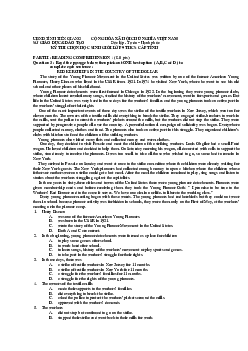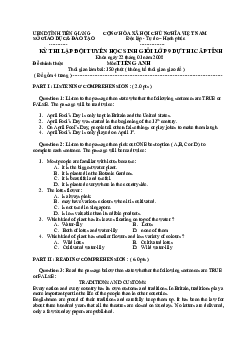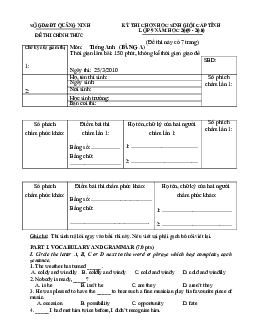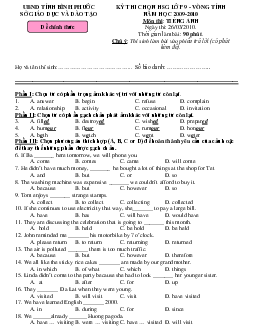











Preview text:
PHÒNG GD&ĐT CỬA LÒ
KỲ THI CHỌN HỌC SINH GIỎI LỚP 9
NĂM HỌC 2021 – 2022 Đề chính thức Môn thi: TIẾNG ANH
Thời gian làm bài: 150 phút (Đề thi có 11 trang) Họ và tên thí sinh: Số báo danh
......................................................................................................................
Ngày tháng năm sinh:...........................................................................................................
Học sinh trường:......................................................................................................................... Số phách
Họ tên, chữ ký giám thị 1:
Họ tên, chữ ký giám thị 2:
................................................................
................................................................ Chỉ dẫn:
1. Đề thi gồm 11 trang. Thí sinh kiểm tra số trang trước khi làm bài.
2. Thí sinh làm bài trực tiếp vào đề thi.
3. Thí sinh giữ gìn bài thi cẩn thận.
4. Nếu thí sinh làm sai, dùng thước gạch, không dùng bút tẩy màu trắng. Thí sinh chỉ dùng bút màu
xanh hoặc đen để làm bài, không dùng mực màu đỏ.
5. Giám thị không giải thích gì thêm.
6. Thí sinh không được sử dụng bất cứ tài liệu gì kể cả từ điển.
7. Riêng phần Nghe: Thực hiện vào đầu buổi thi. Học sinh nghe mỗi phần hai lần trước khi nghe
phần tiếp theo. Giám thị chỉ mở đĩa một lần. Page 1 of 11
Bài thi môn: TIẾNG ANH LỚP 9
Thời gian làm bài 150 phút (bao gồm cả phần nghe) Điểm
Họ tên, chữ ký giám khảo Số phách Bằng số:
Giám khảo 1: …………………………….
……………………….…………. ………………….. Bằng chữ:
Giám khảo 2: …………………………….
………………………………..… ………………….. SECTION A. LISTENING
Part 1 (20 points). Listen to the talk and fill in the gaps. Write ONLY ONE WORD OR A
NUMBER for each answer.
I’m going to talk about an activity that I enyoy doing, and that’s fishing. Actually, I think (1)
_________ said that fishing’s the most (2)_______ hobby in the world. So how do I get
ready? Well if you go fishing, then first you have to get up early. Then you need to pack your
(3)_______ and that includes, er, like … a long, thin stick … I think it’s called a rod, um, a
box or tin to put the fish in and some … er … the little things that you use to (4)_______ the
fish. Also you need to take some warm clothes perhaps and … and (5)_______ you need
something to drink and maybe a (6)_______ because you can get hungry. There are lots of
places where you can go fishing. Some people go to rivers but I live near the beach, so I fish
in a small, yellow, er a small type of boat. Um … I wear a (7)_______ jacket, because I
usually row the boat out to sea – about one kilometer. So people can’t always see me. Fishing
is really quite simple … You just sit and wait. I love it because it’s so (8)_______ . It’s
perfect. But also it’s very exciting when you catch something. I usually get these. Um, what
are they (9)_______ , um long black and white fish. All in all, it’s a wonderful activity - It’s
like a sport. But you’re just (10)_______ with youself or with the nature world. Your answers: 1. 2. 3. 4. 5. 6. 7. 8. 9. 10. Part 2 (10 points).
Listen to Jane and Bill, who are discussing the results of a survey about changes to their town,
Ashtown, over the last 25 years.
Questions 1 – 3 Choose the correct answer, A, B or C.
1. In Bil 's opinion, why are there fewer buses in Ashtown?
A The buses are old and uncomfortable.
B Fares have gone up too much. C There are not so many routes.
2. What change does Bil think has benefited the town centre the most? A the construction of a bypass
B the development of cycle paths C the banning of cars from certain areas
3. Which area does Bil think most people are employed in? A manufacturing B services C education Your answers: 1. 2. 3. Page 2 of 11 Questions 4 – 8
What changes have been made to the facilities?
Choose FIVE answers from the box and write the correct letter, A-G, next to facilities 4-8. Facilities Action
A. it has moved to a new location
4. railway station car park
B. it is now used for a different purpose 5 cinema 6. indoor market
C. it uses more technology than in the past 7. library
D. it has been closed down 8. art college
E. it is less popular than it used to be
F. it has been sold to a differentorganisation G. it has been expanded Your answers: 4. 5. 6. 7. 8.
Part 3 (20 points). Listen to three students talking about their study and indicate whether
the following statements are true or false by writing T for true and F for false in the boxes below.
1. Adel is studying biology.
2. He is studying in Africa.
3. He wants to understand how plants grow.
4. Yun is studying languages.
5. It’s not easy to study this subject.
6. Society in China is changing so fast.
7. This subject helps him know the impact of social changes on people. 8. Esra is in Oman.
9. The subject Esra studies tells us the way people learn in Education.
10. She is studying the differences between men and women in Education. Your answers: 1. 2. 3. 4. 5. 6. 7. 8. 9. 10.
SECTION B: VOCABULARY & GRAMMAR
Part 1 (10 points). Choose the correct answer from A, B, C or D to complete each of the
following sentences. Write it in ‘Your answers’ part.
1. ________, after trying three times, he passed the examination. A. Lastly B. Last of all C. Last D. At last
2. Ann is so ________ to succeed that I am sure nothing will stop her. A. determined B. willing C. strong D. patient
3. Choose the best option A, B, C or D to indicate the word OPPOSITE in meaning to the
underlined part in the following sentence.
We'd better speed up if we want to get there in time. A. slow down B. turn down C. put down D. lie down Page 3 of 11
4 _____ more carefully, he wouldn’t have been in the hospital now. A. Had he driven B. If he drove C. If he drives D. If he hadn’t driven
5. Will you _______ my essay, please, to find out whether I made any mistakes? A. see through B. look through C. look up D. look into
6. - “Have a nice weekend!” - “______.” A. Do you have any plans?
B. I’m going to take it easy. C. Thanks. You too! D. Are you going anywhere?
7. Not until he came into light, ___________him. A. I only recognized B. did I recognized C. I didn’t recognize D. did I recognize
8. Choose the best option A, B, C or D to indicate the phrase that is CLOSEST in meaning
to the underlined part in the following sentence.
They decided to postpone their journey till the end of the month because of the epidemic. A. take up B. turn round C. put off D. do with
9. Nobody liked the film, ______ ? A. does he B. doesn’t he C. did they D. didn’t they
10. Tom: He’s the best guitarist in our school. Mary: ______ A. Never mind. B. That’s fine. C. That’s OK! D. You can say that again. Your answers: 1 2 3 4 5 6 7 8 9 10
Part 2: (10 points) The passage below contains 10 mistakes. Identify the mistakes and
correct them in the space provided. 1
Air pollution are a cause of ill-health in human beings. In a lot of countries there 2
are laws limiting the amount of smoke which factories can produce. Despite there 3
isn't enough informations on the effects of smoke in the atmosphere, doctors have 4
proved that air pollution causes lung diseases. The gases from the exhausts of cars 5
have also increased air pollution in most cities. The lead in pertrol products a 6
poisonous gas which often collects in busy streets surrounding by high buildings. 7 8
Children who live in areas that there is a lot of lead in the atmosphere can't think as 9
quickly as other child and are clumsy when they use their hands. There are other
10 long-term affects of of pollution. If the gases in the atmosphere continue to
11 increase, the Earth's climate may become warmest. A lot of the ice near the
Polesma melt but may cause serious floods. Your answers: Lin Mistakes Corrections Lin Mistakes Corrections e e 1. 6. 2. 7. 3. 8. Page 4 of 11 4. 9. 5. 10 .
SECTION C. READING COMPREHENSION
Part 1 (10 points). Read the passage below and decide which answer (from A, B, C or D)
best fits each gap. Write your answers in ‘Your answers’ part.
PENICILIN BEFORE PENTIUMS FOR THE POOR
One of the hottest topics on the international development agenda is how to harness the
power of International Monetary Fund for the benefit of developing countries. What is
sometimes called ‘the death of distance’, brought about by the (1) ________, allows
professional services such as (2) ________ education and training to be provided easily and
quickly to (3) ________ areas.
Some of the gains can be seen in countries as diverse as India and Morocco, where
innovations range from (4) ________ government announcements to local craftsmen selling
their wares to a (5) ________ market. But already a huge and expanding (6) ________
divide is opening up between developed and developing nations. The major task facing
world leaders at present is to (7) ________ everybody on the planet with clean water, basic
education and the drugs needed to fight preventable diseases. Installing a (8) ________ in
every classroom and linking us all to (9) ________ must be a lesser (10) ________, for the time being at least. 1. A. computer B. telephone C. modem D. internet 2. A. stationery B. software C. hardware D. equipment 3. A. far B. uninhabited C. remote D. secluded 4. A. programmed B. broadcast C. recorded D. online 5. A. global B. technical C. village D. shrinking 6. A. physical B. digital C. electrical D. economical 7. A. supply B. give C. donate D. administer 8. A. plug B. video C. mobile phone D. modem 9. A. the real world B. cyberspace C. virtual reality D. outer space 10. A. priority B. advantage C. importance D. criteria Your answers: 1 2 3 4 5 6 7 8 9 10
Part 2 (10 points). You are going to read an article five people talk about railway
journeys. For questions 1-10, choose from the people (A – E). The people may be chosen more than once. Which person or people
found on returning years later that nothing had changed? 1______
was unsure of the number of passengers on the train? 2______
has a reason for feeling grateful to one special train? 3______
travelled on a railway which is no longer in regular service? 4______
regretted not going on a particular train trip? 5______
used to travel on the railway whenever possible? 6______
learnt an interesting piece of information on a train journey? 7______ Page 5 of 11
took a train which travelled from one country to another? 8______
says that the railway had been looked after by unpaid helpers? 9______
was once considered not old enough to travel by train? 10______ On the rails
Five celebrities tel Andrew Morgan their favourite memories of railway journeys
A. Andrea Thompson - Newsreader
I fell in love with the south of France a long time ago and try to get back there as often as
I can. There’s a local train from Cannes along the coast which crosses the border with Italy. It
takes you past some of the most amazing seascapes. It never matters what the weather is like,
or what time of the year it is, it is always enchanting. Out of the other window are some of the
best back gardens and residences in the whole of France. You feel like someone peeping into
the property of the rich and famous. The travellers themselves are always lively because there
is an interesting mix of tourists and locals, all with different itineraries but all admirers of the breathtaking journey.
B. Arisu Mezuki - Actress
I imagine most people’s favourite impressions of trains and railways are formed when
they are young children, but that’s not my case. I was brought up in Singapore and Cyprus,
where I saw very few trains, let alone travelled on them. It wasn’t until I was a teenager that
trains began to dominate my life. I made a film which featured a railway in Yorkshire. Most
of the filming took place on an old, disused stretch of the line which had been lovingly
maintained by volunteers. That’s where my passion for steam trains began. When we
weren’t filming, we took every opportunity to have a ride on the train, and, when I went
back last year, it was as if time had stood still. Everything was still in place, even the gas
lights on the station platform!
C. Betty Cooper - Novelist
I am indebted to one train in particular: the Blue Train, which took my husband and me
on our honeymoon across France to catch a boat to Egypt.
It was on the train that my husband gave me a pink dress, which I thought was absolutely
wonderful. Someone happened to mention that pink was good for the brain, and I’ve never
stopped wearing the colour since. What I remember about the journey itself, however, is
how lovely it was to travel through France and then by boat up the Nile to Luxor. It was,
without a doubt, the perfect way to wind down after all the wedding preparations
D. Martin Brown - Journalist
We were working on a series of articles based on a round-the-world trip and had to cross
a desert in an African country. There wasn’t a road, so the only way we could continue our
journey was to take what was affectionately known as the Desert Express. The timetable
was unreliable - we were just given a day. We also heard that, in any case, the driver would
often wait for days to depart if he knew there were people still on their way. When it
appeared, there was a sudden charge of what seemed like hundreds of people climbing into
and onto the carriages - people were even allowed to travel on the roof free. During the Page 6 of 11
night, the train crossed some of the most beautiful landscapes I have ever seen. It was like a
dream, like travelling across the moon. E. Raj Patel - Explorer Your answers: 1 2 3 4 5 6 7 8 9 10
Part 3 (10 points). Read the following passage and choose the best answer to each question.
Wood has long been a popular building material in North America because it has
generally been plentiful and cheap. Swedish settlers in Delaware built log cabins as early as
1630s. In New England, British colonists built wooden ‘saltbox houses’. Most of the
wooden homes of Colonial times could be built with simple tools and minimal skills.
In the early 19th century, the standard wooden house was built with beams set into heavy
posts and held together with wooden pegs. This method of construction was time –
consuming and required highly skilled workers with special tools. The balloon – frame
house, invented in 1833 in Chicago by a carpenter from Hartford. Connecticut, used a frame
of lightweight lumber, mostly 2 x 4 and 2 x 6 inches. This type of house could be assembled
by any careful worker who could saw in a straight line and drive a nail.
This revolution in building was made possible by improved sawmills that could quickly cut
boards to standard sizes and the lower cost of lumber that resulted. There were also new
machines that could produce huge quantities of inexpensive nails. Skeptics predicted that a
strong wind could send such houses flying through the air like balloons and, at first ‘balloon
frame’ was a term of derision. But the light frames proved practical, and wooden houses
have been basically built this way ever since.
1. What is the main purpose of the passage?
A. To trace the influence of Swedish and British settlers on American styles of buildings.
B. To stress the importance of wood as a building material.
C. To compare methods of constructing wooden houses in various parts of the country.
D. To describe a revolutionary technique for constructing wooden houses.
2. According to the passage, where did the inventor of the balloon - frame house originally come from?
A. Connecticut B. Chicago C. Sweden D. Delaware Page 7 of 11
3. Which of the following questions about the balloon-frame house is NOT answered in the passage? A. Where was it invented?
B. What was its inventor’s name?
C. What size was most of the lumber used in its framework?
D. In what year was it invented?
4. The author implies that which of the following types of houses required the most skill to produce?
A. The log cabin built by Swedish settlers. B. Saltbox houses.
C. Standard wooden houses of the early 19th century. D. Balloon – frame houses.
5. All of the following are factors in the development of the balloon - frame house EXCEPT ______.
A. the invention of sophisticated tools B. the production of cheap nails
C. improvements in sawmills D. the falling price of lumber
6. According to the passage, why was the term balloon -frame applied to certain houses?
A. They could be moved from place to place.
B. They could be easily expanded.
C. They had rounded frames that slightly resembled balloons.
D. They were made of lightweight materials.
7. The word ‘derision’ is closest in meaning to _______.
A. Affection B. ignorance C. ridicule D. regret
8. Skeptics thought that the balloon – frame house would be _________.
A. expanded B. blown away C. demolished D. raised
9. The standard method of construction in the early 19th century was described as ________.
A. revolutionary B. basic C. innovative D. time – consuming
10. Most of the wooden houses of Colonial times were _________.
A. difficult to build B. easy to build C. demanding D. challenging Your answers: 1 2 3 4 5 6 7 8 9 10
Part 4 (10 points). Fill ONE suitable word into each numbered blank. Write your
answers in ‘Your answers’ part.
When studying a foreign language abroad, a large majority of students choose
‘homestay’ accommodation, living with a (1)_____________ family while they attend
classes in a nearby language school.
Very (2) _____________, however, once lessons have finished, students speak their mother
tongue with other class members of the same nationality. On a Homestay Language
International study trip, we ensure total immersion in the target language environment by
arranging accomodation and one-byone tuition in your teacher’s home, so that you (3)
_____________ surrounded by the language during every moment of your stay. As you are
the only student, you can learn (4)_____________ your own pace, and the lessons are made
to suit your individual interests and objectives. You will also have the chance to (5)
_____________fully in your host teacher’s activities, including trips to places of (6) Page 8 of 11
_____________ in the local area. All of our teachers have a university degree and a relevant
(7) _____________ qualification, and most have spent much time abroad and they can
understand the needs and concerns of their (8)_____________ guests. Homestay Language
International offers a wide range of general or business courses for young and old alike,
with a choice of (9) _____________ 80 destinations throughout the world. Whether it’s
English in New Zealand, French in Canada or German in Austria, you can expect a (10)
_____________ welcome in a relaxed home environment and an unforgettable study experience. Your answers: 1 2 3 4 5 6 7 8 9 10
Part 5 (10 points). Choose the most appropriate heading from the list A-H for each part
(1-5) of the article. There are TWO extra headings which you do not need to use. The
first has been done as an example. Lists of Headings
A. Keep calm D. Be organized G. Making friends during exams
B. Vary the way you revise E. Reward yourself
H. Remembering the difficult bits
C. Set yourself targets
F. Write down the main points
HOT TIPS FOR STAYING COOL AT EXAM TIME 0. _____C_____
It’s always good to know what you’re aiming for so that you know if and when you get
there. By having an aim for each week, or even each day, it will help you check your
progress and show you if you need to change your plans. 1. ___________
Rather than have to work through masses of notes every time you revise something, try
noting down things you want to remember on a piece of paper. It doesn’t seem much to
learn that way, but it makes sure you don’t miss out anything important. Once you’ve learnt
the main points, rewrite them on another piece of paper without looking at your notes. 2. ___________
There is nothing worse than being confused about what you need to prepare for your
coming exam. If you have a plan and stick to it, you won’t end up cramming all your
revision into the last few hours! Make a list of your exams and what you need to learn
beforehand, and then drew up a timetable covering all the topics. You can then work out
what you need to do on a weekly basis and when you are going to do it. 3. ___________
By now you’ll probably have discovered the method of revision which suits you best. But
every now and then it might be helpful to try a different method. You could try working
with a group of friends, or using a different book which covers things from a new angle.
Whatever it is, just try something different occasionally. Page 9 of 11 4. ___________
Some things are almost impossible to remember, so you may need to do something unusual
to help you remember. Try writing them down in large letters and bright colors and sticking
them on the fridge, on a mirror or on the bathroom door. Try recording them onto a cassette
player and keep playing it back to yourself - on a personal stereo if you have got one! 5. ___________
Not too many people like exams and most of us get nervous before and during exams. But if
you’ve followed your plan and put the effort into revising, then there is no need to worry or
panic. Hopefully these tips will have helped you. Give it your best shot - that’s all that anyone can expect from you. Your answers: 1. 2. 3. 4. 5. SECTION D. WRITING
Part 1 (10 points). Use the word in brackets, complete the second sentence so that it has
a similar meaning to the first one. DO NOT change the word given.
1. We couldn’t get to work because it rained heavily . ( PREVENTED )
=> The heavy ___________________________________to work.
2. Delia will no longer tolerate her colleagues being rude. (PUT)
=> Delia will not _______________________________from her colleagues any longer
3. Jim does not intend to give up his hobby. (INTENTION)
=> Jim has _____________________________________ his hobby.
4. Why don’t you decorate your room with wallpaper ?”Mai said to Hoa.(SUGGESTED)
=> Mai ___________________________________________ with wallpaper.
5. They listened eagerly and attentively to the President’s speech. (EARS)
=> They_______________________________________ to the President’s speech.
Part 2 (20 points). This is part of a letter you received from an English friend: ... In your
next letter, could you give me some advice? Tell me how to keep fit and healthy these days!
Now write a letter to this penfriend. You should write about 80 - 100 words. You are not
allowed to include your real name.
….……………………………………………………………………………….
…………………………………………………………………………………………..
……………………………………………………………………………………………..
……………………………………………………………………………………………..
……………………………………………………………………………………………..
……………………………………………………………………………………………..
……………………………
….…………………………………………………………………………….
…………………………………………………………………………………….……….
…………………………………………………………………………………….……….
…………………………………………………………………………………….…….
……………………………………………………………………………………….……….
…………………………………………………………………………………….……….
…………………………… Page 10 of 11
….………………………………………………………………………….
……………………………………………………………………………………….……….
………………………………………………………………………………….……….
…………………………………………………………………………………….………….
……………………………………………………………………………….….
………………………………………………………………………………………….….
………………………………………
….………………………………………………………………….
…………………………………………………………………………………………..
……………………………………………………………………………………………..
……………………………………………………………………………………………..
……………………………………………………………………………………………..
…………………………………………………………………………………………….
………….………………………………
…………………………………………………………………….………….
……………………………………………………………………………….….
………………………………………………………………………………………….….
………………………………
P art 3 (30 points). Your English teacher has asked you to write a story (100-120 words)
for your school story writing competition. Your story MUST begin with the following sentence:
He didn’t think that Lan was such a stupid friend…………………. ….……...…………….
….…………………………………………………………………………….
…………………………………………………………………………………….……….
…………………………………………………………………………………….……….
…………………………………………………………………………………….…….
……………………………………………………………………………………….……….
…………………………………………………………………………………….……….
……………………………
….………………………………………………………………………….
……………………………………………………………………………………….……….
………………………………………………………………………………….……….
…………………………………………………………………………………….………….
……………………………………………………………………………….….
………………………………………………………………………………………….….
………………………………………
….………………………………………………………………….
…………………………………………………………………………………………..
……………………………………………………………………………………………..
……………………………………………………………………………………………..
……………………………………………………………………………………………..
…………………………………………………………………………………………….
………….………………………………
………………………………………………………………….………….………………….
……………………………………………………………..…………………………………
……………………………………………………………..………………………………… Page 11 of 11
……………………………………………………………..…………………………………
……………………………………………………………..………………………………… THE END ! Page 12 of 11
Document Outline
- Listen to Jane and Bill, who are discussing the results of a survey about changes to their town, Ashtown, over the last 25 years.
- 1. In Bill's opinion, why are there fewer buses in Ashtown?
- A The buses are old and uncomfortable. B Fares have gone up too much. C There are not so many routes.
- 2. What change does Bill think has benefited the town centre the most?
- A the construction of a bypass B the development of cycle paths C the banning of cars from certain areas
- 3. Which area does Bill think most people are employed in?
- A manufacturing B services C education
- Action
- Air pollution are a cause of ill-health in human beings. In a lot of countries there are laws limiting the amount of smoke which factories can produce. Despite there isn't enough informations on the effects of smoke in the atmosphere, doctors have proved that air pollution causes lung diseases. The gases from the exhausts of cars have also increased air pollution in most cities. The lead in pertrol products a poisonous gas which often collects in busy streets surrounding by high buildings.
- Children who live in areas that there is a lot of lead in the atmosphere can't think as quickly as other child and are clumsy when they use their hands. There are other long-term affects of of pollution. If the gases in the atmosphere continue to increase, the Earth's climate may become warmest. A lot of the ice near the Polesma melt but may cause serious floods.




